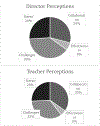Implementing a School Readiness Intervention in Community-based Childcare Centers: Director and Teacher Perceptions
- PMID: 35600504
- PMCID: PMC9119566
- DOI: 10.1080/10409289.2020.1833162
Implementing a School Readiness Intervention in Community-based Childcare Centers: Director and Teacher Perceptions
Abstract
In the U.S., one-third of preschool children attend programs run by childcare centers. Childcare centers are generally isolated and under-resourced businesses, often challenged by high rates of teacher turnover and inconsistent financial support. Correspondingly, childcare centers often struggle to provide high-quality educational experiences for preschool children. This study introduced an evidence-based curriculum (REDI) to improve the educational experiences of preschool children in childcare centers and used a novel professional development (PD) model in which center directors were trained to serve as local coaches. Open-ended interviews with 45 teachers and 31 center directors evaluated the acceptability, feasibility, and effectiveness of the REDI intervention and coaching model. Participants also described their workplace and rated their intentions regarding future program use. Participants described multiple challenges in the workplace but generally positive perceptions of the REDI intervention. Perceptions regarding the feasibility of the coaching model were mixed. Workplace descriptions were associated with intervention experiences which, in turn, predicted intentions for future program use. Findings validate the importance of addressing the unique workplace challenges faced by childcare staff when designing classroom interventions and PD supports. Attending to program acceptability, feasibility, and perceived effectiveness in these settings may be critical to support sustained use.
Conflict of interest statement
Conflicts of Interest The authors declare that they have no conflicts of interest associated with the current study.
Figures
Similar articles
-
Predicting school readiness program implementation in community-based childcare centers.Front Psychol. 2022 Dec 15;13:1023505. doi: 10.3389/fpsyg.2022.1023505. eCollection 2022. Front Psychol. 2022. PMID: 36591043 Free PMC article.
-
Perceived factors that influence adoption, implementation and sustainability of an evidence-based intervention promoting healthful eating and physical activity in childcare centers in an urban area in the United States serving children from low-income, racially/ethnically diverse families.Front Health Serv. 2022 Nov 4;2:980827. doi: 10.3389/frhs.2022.980827. eCollection 2022. Front Health Serv. 2022. PMID: 36925814 Free PMC article.
-
Let's Wiggle with 5-2-1-0: Curriculum Development for Training Childcare Providers to Promote Activity in Childcare Settings.J Obes. 2016;2016:8967092. doi: 10.1155/2016/8967092. Epub 2016 Jul 4. J Obes. 2016. PMID: 27462468 Free PMC article.
-
Peer coaching: building collegial support for using innovative health programs.J Sch Health. 1993 Feb;63(2):79-85. doi: 10.1111/j.1746-1561.1993.tb06085.x. J Sch Health. 1993. PMID: 8479163 Review.
-
The Efficacy of Workplace Interventions on Improving the Dietary, Physical Activity and Sleep Behaviours of School and Childcare Staff: A Systematic Review.Int J Environ Res Public Health. 2020 Jul 11;17(14):4998. doi: 10.3390/ijerph17144998. Int J Environ Res Public Health. 2020. PMID: 32664554 Free PMC article.
Cited by
-
Predicting school readiness program implementation in community-based childcare centers.Front Psychol. 2022 Dec 15;13:1023505. doi: 10.3389/fpsyg.2022.1023505. eCollection 2022. Front Psychol. 2022. PMID: 36591043 Free PMC article.
-
"It's Like Making Reflective Practice More of the Heart of Who We Are": An Exploration of Facilitators and Barriers to Implementing Reflective Supervision in State Pre-K.Prev Sci. 2024 Dec;25(8):1262-1274. doi: 10.1007/s11121-024-01744-0. Epub 2024 Nov 8. Prev Sci. 2024. PMID: 39514028
-
Feasibility, Acceptability, and Preliminary Effectiveness of a Reflective Supervision Professional Development Series Within Early Care and Education.Early Educ Dev. 2025;36(5):967-990. doi: 10.1080/10409289.2024.2424733. Epub 2024 Nov 10. Early Educ Dev. 2025. PMID: 40917238
References
-
- Ackerman DJ, Barnett WS, Hawkinson LE, Brown K, & McGonigle EA (2009). Providing preschool education for all four-year-olds: Lessons from six state journeys. New Brunswick, NJ: National Institute for Early Education Research.
-
- Ackerman DJ & Sansanelli RA (2010). The source of child care center preschool learning and program standards: Implications for potential early learning challenge fund grantees. Early Childhood Research and Practice, 12 (2).
-
- Aguilar E (2013). The art of coaching: Effective strategies for school transformation. Hoboken, NJ: John Wiley & Sons.
-
- Assel MA, Landry SH, Swank PR, & Gunnewig S (2004). An evaluation of curriculum, setting, and mentoring on the performance of children enrolled in pre-kindergarten. Reading and Writing, 20, 463–494.
Grants and funding
LinkOut - more resources
Full Text Sources



